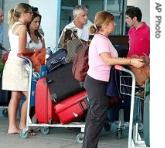正文
VOA慢速英语: Kenya election violence threatens its economic gains
Download Audio
This is IN THE NEWS in VOA Special English.
The violence this week in Kenya has thrown the usually peaceful country into crisis. Its economic and democratic progress may be in danger.
The crisis began Sunday after election officials declared President Mwai Kibaki the winner of a second term. On Friday Kenya's main opposition party, the Orange Democratic Movement, called for a new election.
Its candidate in the December 27 election, Raila Odinga, held the lead in early vote totals. He says the narrow victory for Mister Kibaki was the result of cheating.
A spokesman for the president said the government will accept another election if a court orders a new vote.
On Thursday, Kenya's attorney general, Amos Wako, called for independent confirmation of the election results. But he said only a court had the power to cancel Mister Kibaki's victory. Kenyans first elected him in 2002 on a promise to fight corruption.
More than three hundred people have been killed in Nairobi, the Rift Valley and Mombasa. The violence has involved fighting between police and protesters and between ethnic groups.

There are fears of wider conflict between Luos, who support Mister Odinga, and Kikuyus, who support the president. Both sides have accused each other of acts of genocide.
On Tuesday, a mob set fire to a church in Eldoret, in the Rift Valley. At least thirty Kikuyu children and adults burned to death. They had gone to the church seeking safety.
The United Nations said the unrest has displaced 250,000 people within Kenya. Several thousand people are believed to have fled to Uganda in recent days.
Kenya became independent from Britain in nineteen sixty-three. It has the largest economy in East Africa, and in recent years has been the area's most politically secure country.
Kenya has held multiparty elections since 1992. But Kikuyus have long ruled the country, both politically and financially.
The Kikuyu tribe is the largest of more than forty ethnic groups in Kenya. Twenty-two percent of Kenya's estimated thirty-seven million people are Kikuyu.
The United States at first had congratulated President Kibaki on his re-election. Later it withdrew the statement as European Unions observers and others questioned the fairness of the election.
The United States announced it was sending its top diplomat for Africa, Jendayi Frazer, to Kenya to appeal for political discussions. Mister Kibaki says he is open to talks with his opponents after the violence has ended.
In some of Kenya's poorest areas, people have begun to say it is time for peace. Kenya has had riots and ethnic conflict in past years. But there are concerns that foreign investors might now lose trust in the country.
The World Bank says it is concerned that the unrest threatens recent gains in economic growth and poverty reduction. A statement from the bank and other development agencies noted that Kenyan media have launched a "Save Our Beloved Country" campaign.
And that's IN THE NEWS in VOA Special English, written by Brianna Blake. I'm Steve Ember.
相关文章
- Does Software that Explains Itself Really Help?
- Abolitionist Newspaper Returns 200 Years after Its Launch
- 多林戈英语测试获得支持 但问题依然存在
- Students Return to Campus, HBCU Gains, New TOEFL and More
- 创造英语沉浸体验
- 卢旺达的美国英语学习者成为麻省理工学院教授
- 感恩节与英语语法
- 疫情期间 学习英语的学生经历了一段困难时期
- VOA慢速英语:国际足联和欧洲足联反对12家具乐部组建欧洲超级联赛
- VOA慢速英语:NASA火星直升机Ingenuity成功实现历史性首飞




 手机网站
手机网站